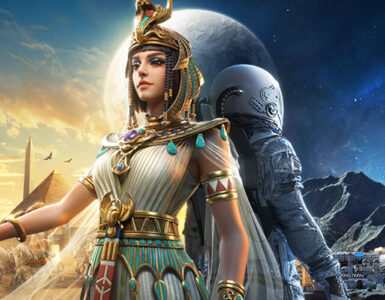If there’s a video game franchise that embodies the famous catchphrase from the 1981 film History of the World, Part 1, “It’s good to be the king,” it’d be Sid Meier’s Civilization. The beloved series of turn-based strategy titles has left a strong cultural footprint on the 4X landscape (where victory is attained through four routes: eXplore, eXpand, eXploit, and eXterminate) as not only has it been credited for defining elements of the genre, its premise of reshaping world history offers an addictive thrill that few other titles can live up to.
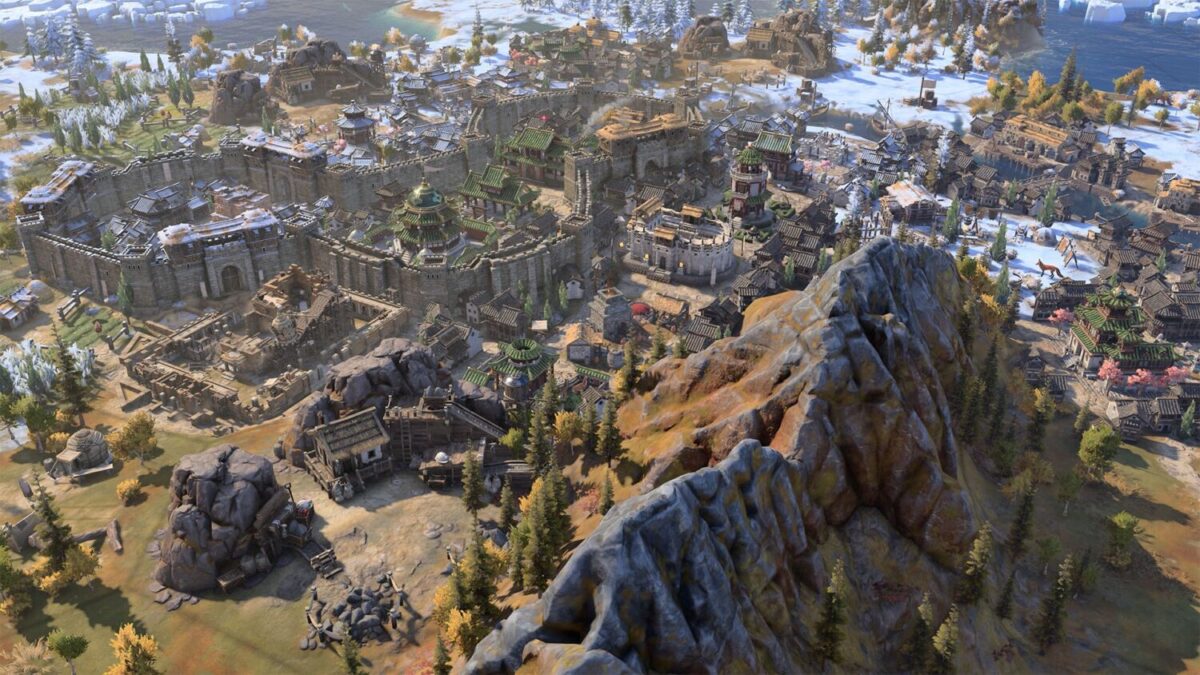
With Sid Meier’s Civilization VII, developer Firaxis Games returns to honour the rule of thirds tradition. As with every follow-up entry in the series, players can expect that a third of the game contains brand new features, with ⅓ seeing improvement on existing ones, and the remaining 33 per cent of the game staying roughly the same, allowing for a fresh yet familiar experience for all players.
This nine-year gap – the last mainline outing came out in 2016 – also presents a good opportunity to cultivate a new generation of aspiring leaders, world dominators or cultural messiahs, especially given its increased focus on accessibility. Seven iterations in, the series is the most beginner-friendly it’s ever been, even when it’s built upon a dense foundation of strategic flair that veterans love.
Here are seven major features of Civilization VII that anyone can enjoy.
1) Ushering in a new Age
In with the new, and out with the old. Marking a departure from the single civilisation system from before, the Ages mechanic divides a single game into distinct playable chapters, with each bearing the essence of a specific historical period of human advancement. The Antiquity Age, for instance, is rooted in the transition of clustered agricultural societies into urban centres, while Exploration follows empires as they expand and conquer distant lands. Finally, the Modern Age denotes a time of modern technological marvels and global conflict, aligning more closely with the world we live in currently.
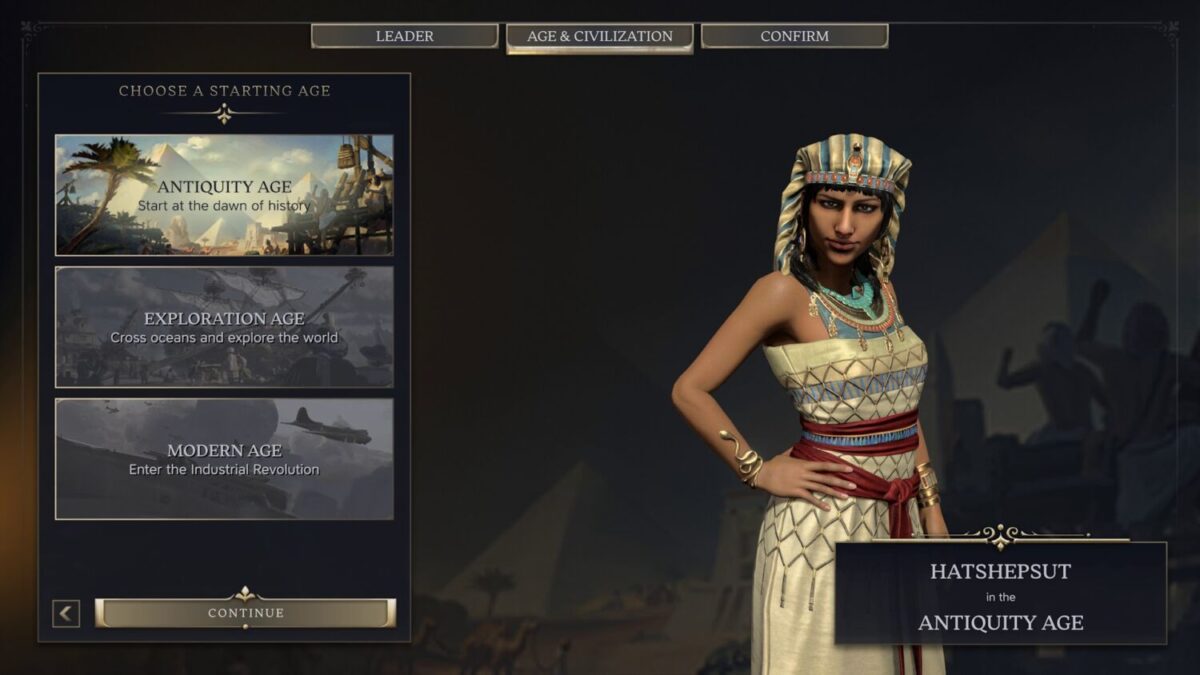
It’s not entirely foreign territory, though. At its core, Civilization VII is still about building capitals, finding resources, discovering new lands, and cooperating or competing with other civilisations, except that key elements are now unique to every Age, extending to Civilisations, Resources, Civics and Technology, and Buildings and Units, among others.
More notably, all players can and will experience an Age Transition simultaneously after completing an Age, allowing them to select bonuses and retain key elements of their civilisation as they move out of a Crisis – a compulsory challenge all civilisations in the game must face and navigate near the end of an Age, before transitioning to a new, more advanced one. Completing milestones along a Legacy Path, which lists objectives and categorises them into Science, Military, Culture, and Economy, also counts towards progression.
Even so, there’s a method to a nation’s cultural and technological evolution, so a new civilisation cannot be selected randomly with every shift to a new Age, as these are further determined across three factors: a historical or geographical connection between the past and current civilisation; a leader’s particularly strong identity that automatically unlocks certain new civilisations, and finally, gameplay actions capable of unlocking non-historical paths.
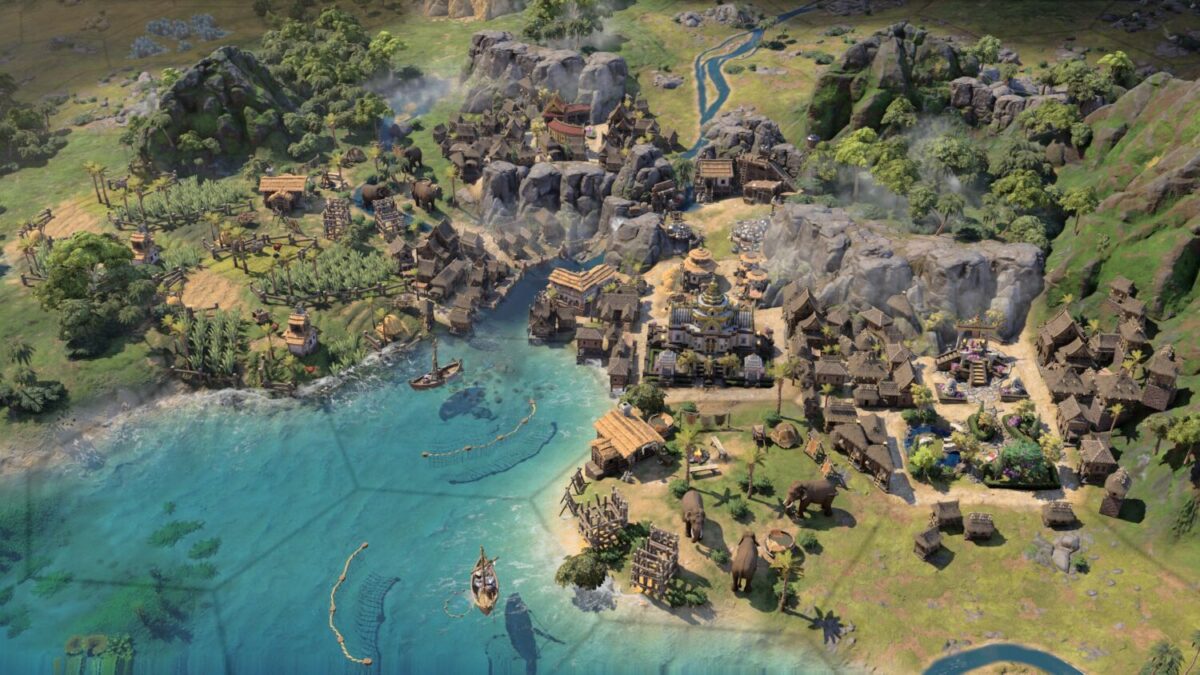
For players with birth roots tracing back to Southeast Asia and Asia, Civilization VII promises some regional representation in the form of Khmer (modern-day Cambodia) in the Antiquity Age, Majapahit (Indonesia’s last Hindu kingdom) in the Exploration Age, and lastly, Siam (Thailand’s official name until 1939) in the Modern Age.
2) A free-for-all scramble for leaders and civilisations

Say hello to the decoupling of esteemed leaders of legends and their associated proud civilisations, as Firaxis’ latest no longer requires the same paired combo throughout the game. In a first for the series, the ability to mix and match both elements is made available for improved flexibility and a greater sense of freedom, alongside the opportunity to establish your own alternate world history if you succeed in world domination. Figures of philosophy, human rights, science, and more, including Confucius and Benjamin Franklin, have also been elevated to leader status, offering access to more varied play styles unique to each ruler, especially when paired with a strange, foreign empire.
This time, notable leaders hailing from Southeast Asia nations will join in on the action, including fresh additions such as José Rizal, long regarded as the hero of the Philippines, and Trung Trac, a symbol of Vietnamese independence, but this time, Rizal could be leading the Mississippians, or the Greeks led by Ben Franklin.
There’s also the new Attribute System introducing a more precise way to further customise leaders through the following categories: Cultural, Diplomatic, Economic, Expansionist, Militaristic, and Scientific. This grouping is designed to align with the same six playstyles that a civilisation can adopt, each bringing different specialisations and determining the affinity towards earning certain Attribute points, which are spent on attribute Skill Trees and growing a leader’s strength.
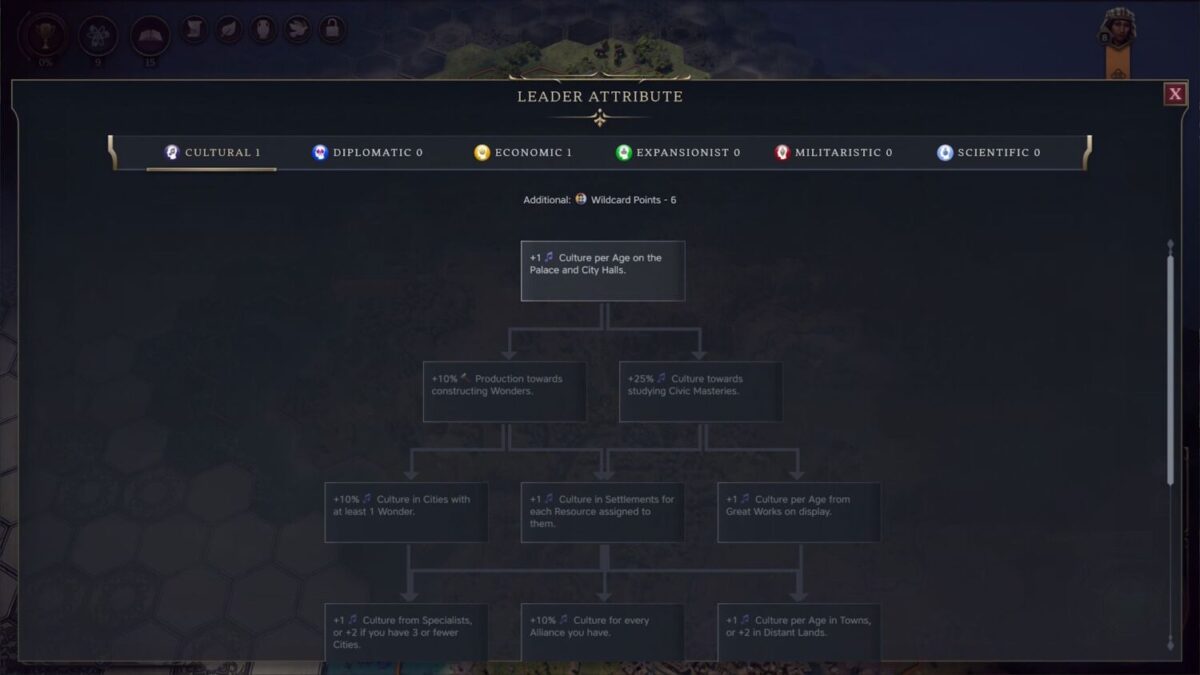
For example, Roman emperor Augustus’ strong Culture approach means more chances to earn Cultural Attribute points, and the characters and traits of civilisations sport similar variations. Han China’s Unique Civilian Unit, known as Shi Dafu, grants a random attribute out of a possible option of 10 perks, but each can only be received once, and will increase in cost for each subsequent unit acquired. Meanwhile, Maya’s Jaguar Slayer gives the Scout the power to create an invisible trap on Vegetated tiles. What’s more important, though, is that Attributes and their bonuses carry across Ages, ensuring the simultaneous growth of both the empire and its leaders.
3) Building Towns from Cities
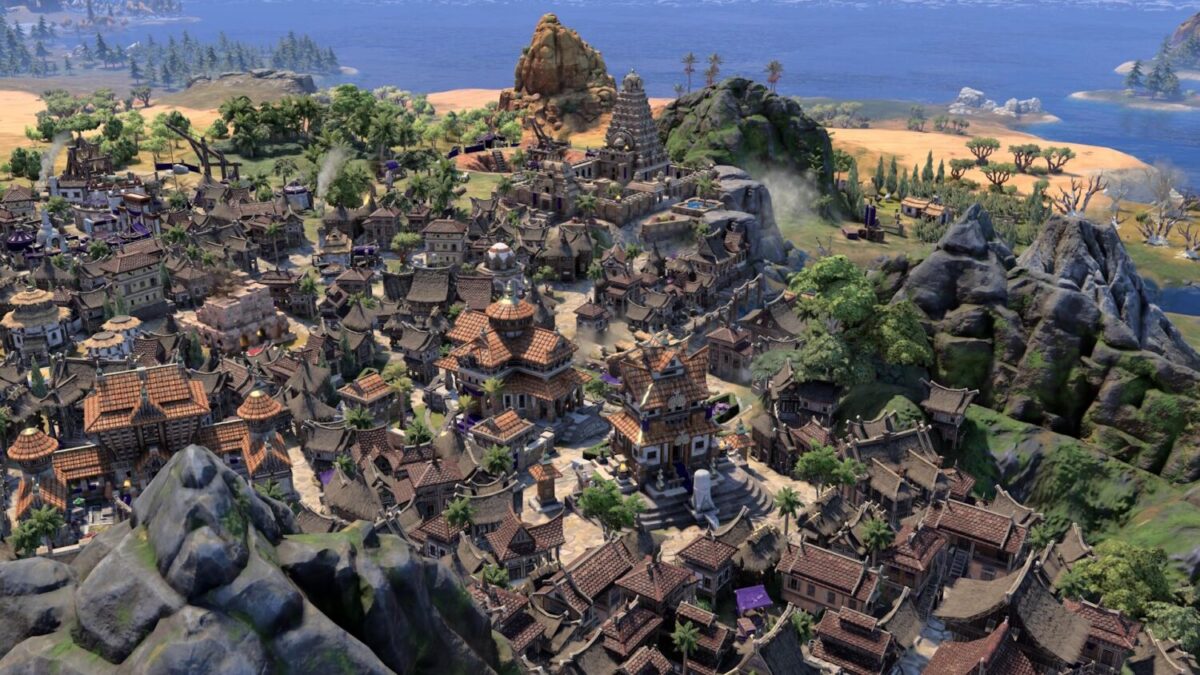
In Civilization VII, Cities and Towns are now two distinct entities. Evolving from the singular focus on the former, the gameplay tweak sets Towns up as essential support hubs that automatically convert their Production into Gold, while opening up various support roles for the player’s empire via specialisation.
Reaching a fixed Population threshold unlocks a Focus Menu and specialisation options for one of several roles, including Forming Towns for Food Production, Fort Towns for Unit healing and defense, Trade Outposts for increasing trade range and boosting Happiness, and more. Compared to before, this streamlined approach puts strategy into focus and makes expansion a less overwhelming affair, since the constant input that follows the addition of each new City is no longer required.
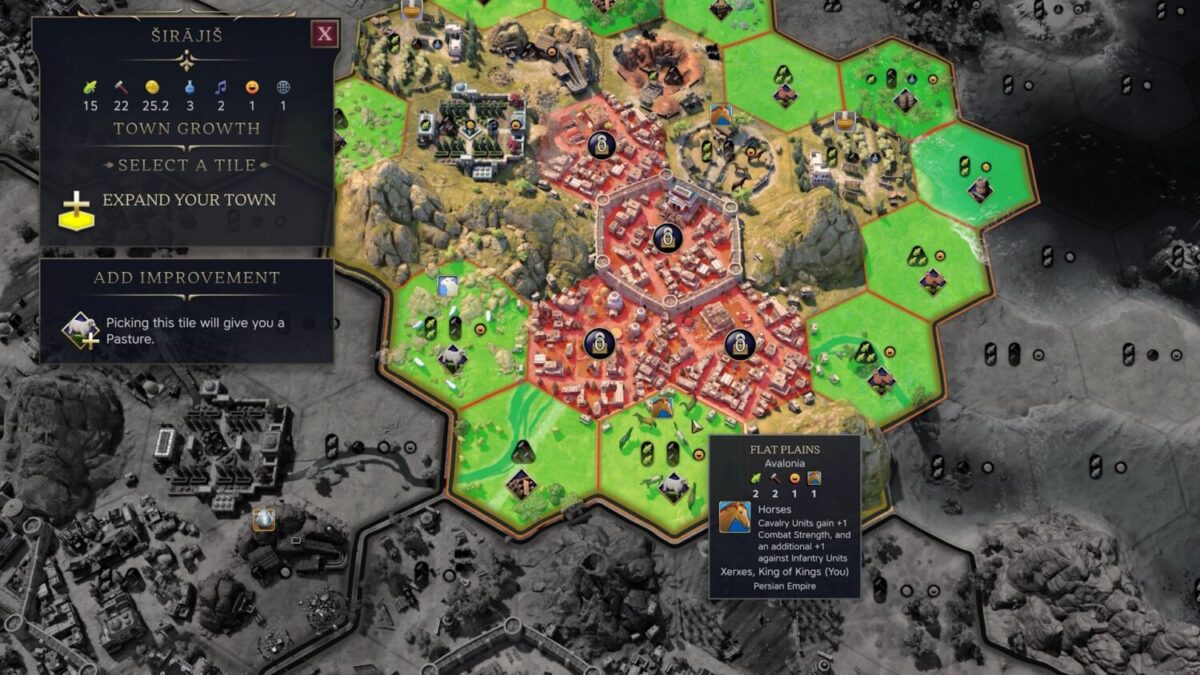
The removal of Builder Units also feeds into the accessibility rhetoric as instead of deploying them to improve tiles on a map, the act is now tied to Population growth, which is designed to naturally drive improvements. Here’s how it works – Food is accumulated in a bucket as Settlements generate them, and once their growth bucket is filled, players will gain a Population point to be allocated for tile development. Don’t be overeager, however, as exceeding the Settlement Cap for Cities and Towns results in decreased Local Happiness, and by extent, the yield of Global Happiness.
4) Setting new historical immersion standards
Making new history has always been one of the biggest appeals of Civilization, and its seventh outing continues to build on this premise. The Emergent Narrative system seeks to inject a more immersive flair into storytelling, revealing a snapshot of what might be happening to individual inhabitants of an empire, and prompting players to make two or three choices.
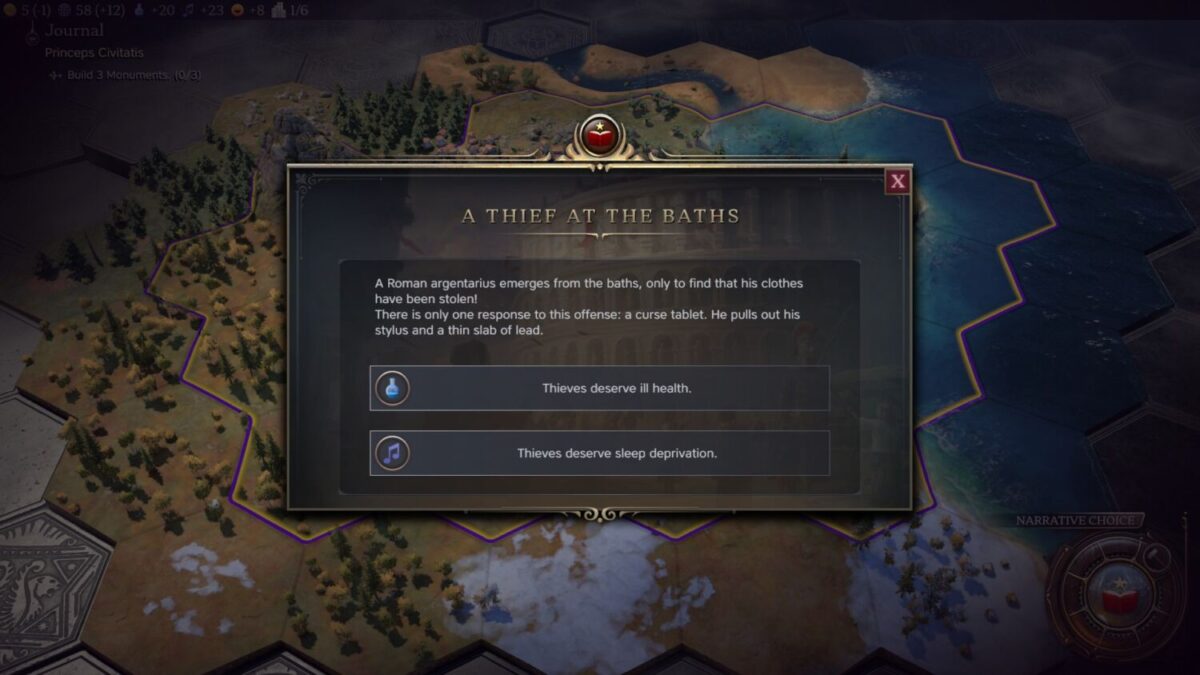
Courtesy of a modifier system combining requirements (conditions) and effects (outcomes), the new mechanic is built to track major moments in a game and respond with events tailored to the playthrough. The requirements to trigger a narrative event are varied, ranging from leader and civilisation choice to specific gameplay moments, and these can happen at any point once the former is fulfilled.
In some cases, applying a narrative tag allows players to call back to their previous choice and tell stories across Ages, some of which will resonate with actions carried out in the earlier Ages and reference in-game developments that took place thousands of years ago. To encourage replayability and the experience of the unknown, a single playthrough only reveals a subset of these narrative events, broadly categorised into historical events, what-if scenarios, and unique gameplay moments.
5) Streamlining the call-to-arms process for combat
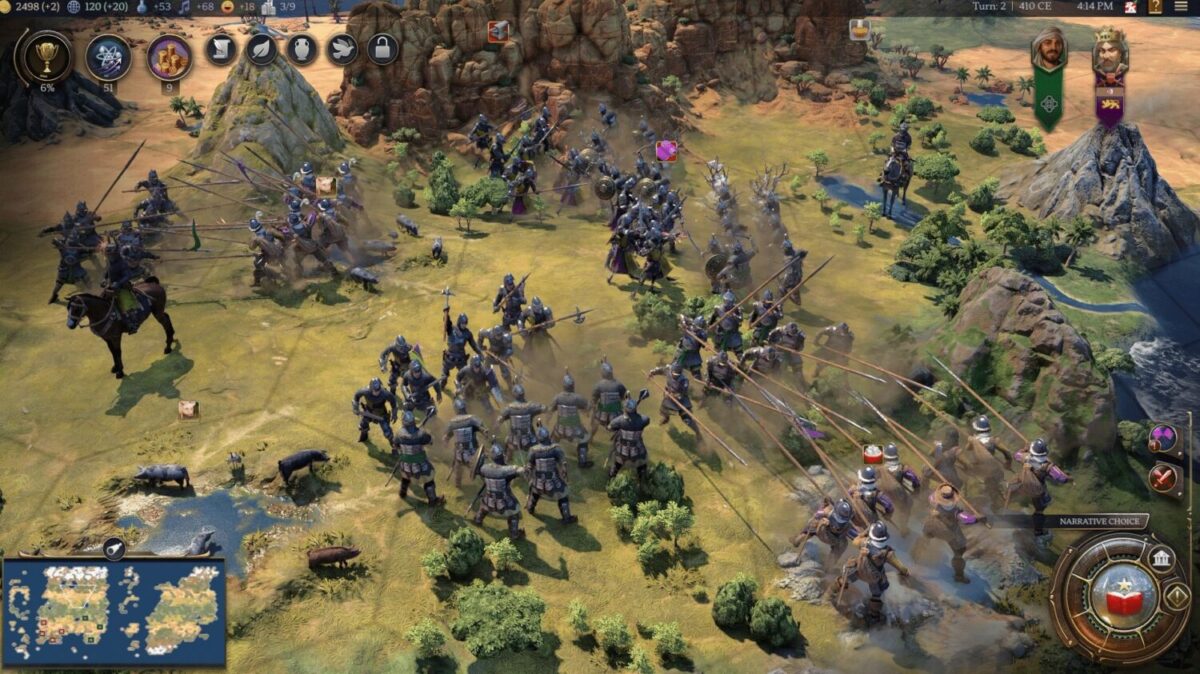
Unlike its predecessors, Civilizations VII puts power solely in the hands of Commander units. Individual combat units are no longer able to earn promotions; instead, their involvement in battles directly affects the experience gained by a Commander, whose promotion brings various buffs and bonuses on and off the battlefield.
Designed to alleviate the stresses of micromanagement, these all-new military leaders tout the ability to pack nearby troops into a single “stack”. Doing so grants a movement bonus, enabling faster relocation and the deployment of units to adjacent tiles, where they can attack enemy forces, lay siege to cities, or defend territory. Additionally, Commanders are equipped with other capabilities like requesting Reinforcements – which automates the process of bringing new units to their location – and ordering multiple units within a Command Radius at once by using special actions.
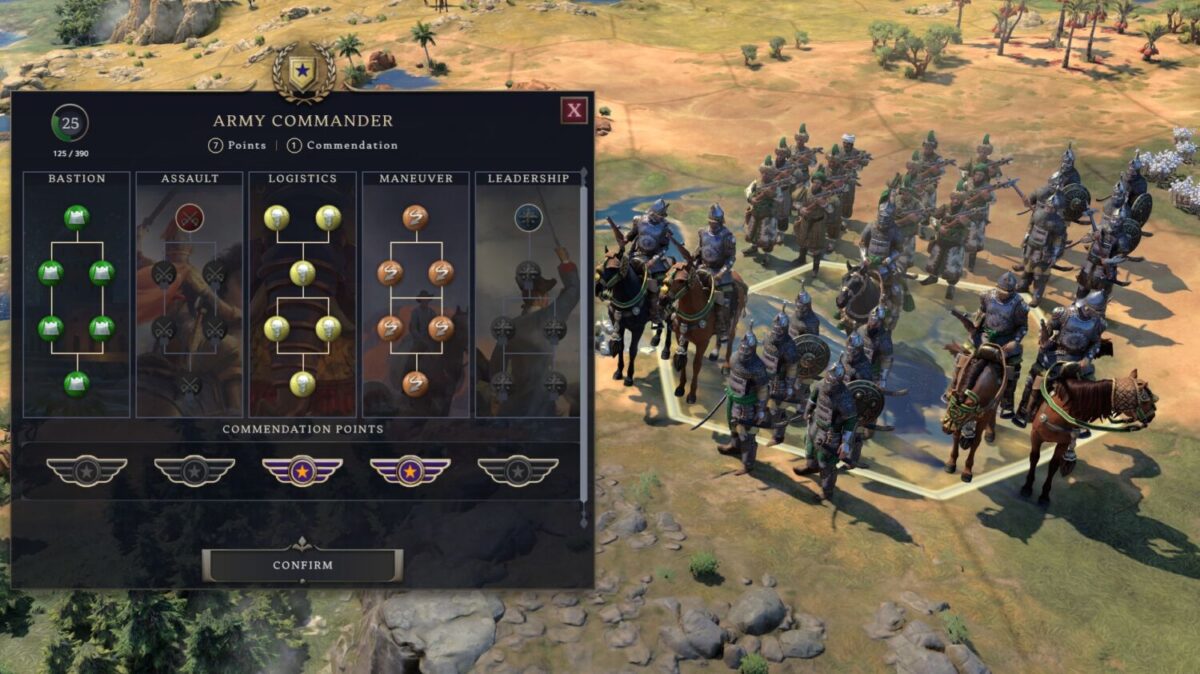
The ageless nature of Commanders also ensures their continued dominance on the battlefield, as all experience and promotions earned in past Ages will be retained (think of it as the legacy of battle-tested Commander who is imparting knowledge to future generations). To spec them in different ways, players can dive into a single discipline tree or spread their proficiency across multiple ones, with slightly different sets for each of the unique unit types for ground, naval, and aerial combat.
6) A new yield for cultivating friendships, betrayals, and alliances
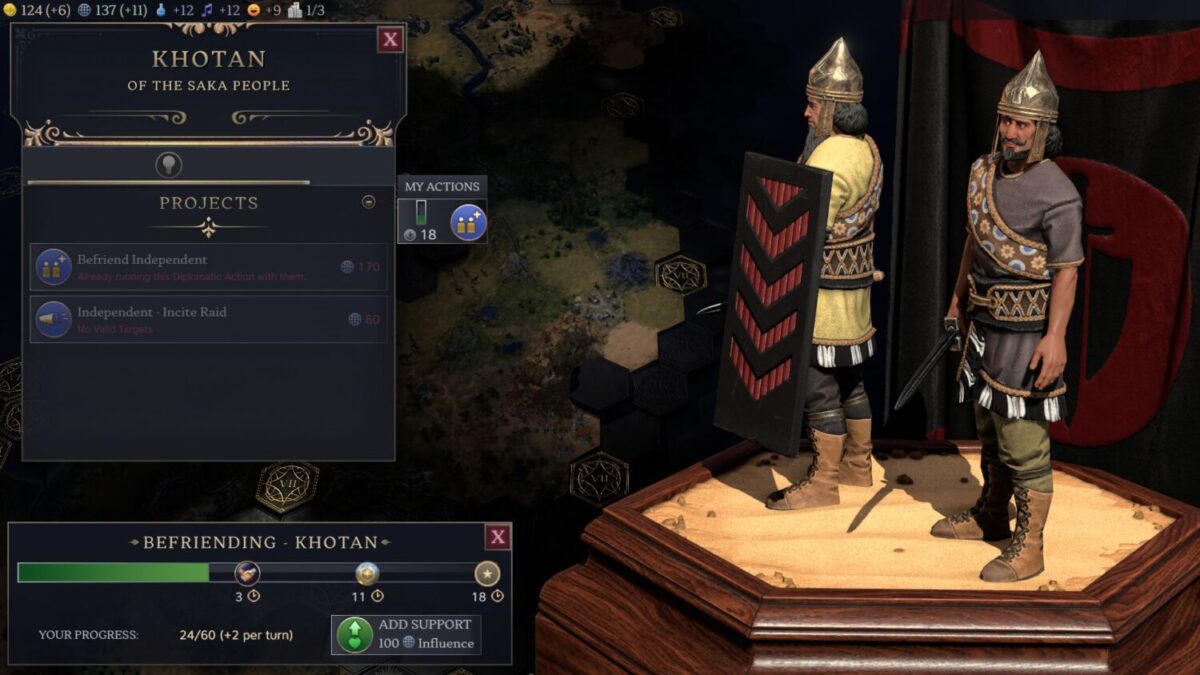
Diplomacy has never been more important in the Firaxis’ world of reimagined history. With a heavier emphasis on building relationships and maintaining ties, Civilization VII finds a new yield in Influence, which serves as the primary currency of the diplomacy system. Accumulated on a per-turn basis, it’s required for four main types of actions: Endeavours, defined as mutually beneficial actions between two empires; Sanctions, or negative actions; Treaties, which are longer-lasting decisions with ultility, such as opening borders; and Espionage, high-risk, high-reward actions that grant a bonus or inflict a negative effect on another empire. In response, the other party can support, accept, and reject each of the non-espionage options.
Similar to the workings of other yields in the game, Influence comes from Buildings, social policies, attributes, leaders, civilisation abilities, Wonders, and more, but can be reduced through negative actions on the world stage, such as razing Settlements. Influence is also required to interact with Independent Powers, opening up opportunities for making new allies and improving friendly ties over time. Transform them into a City-State to unlock more diplomacy choices, from building their military and levying their Units to inciting a raid on other empires.
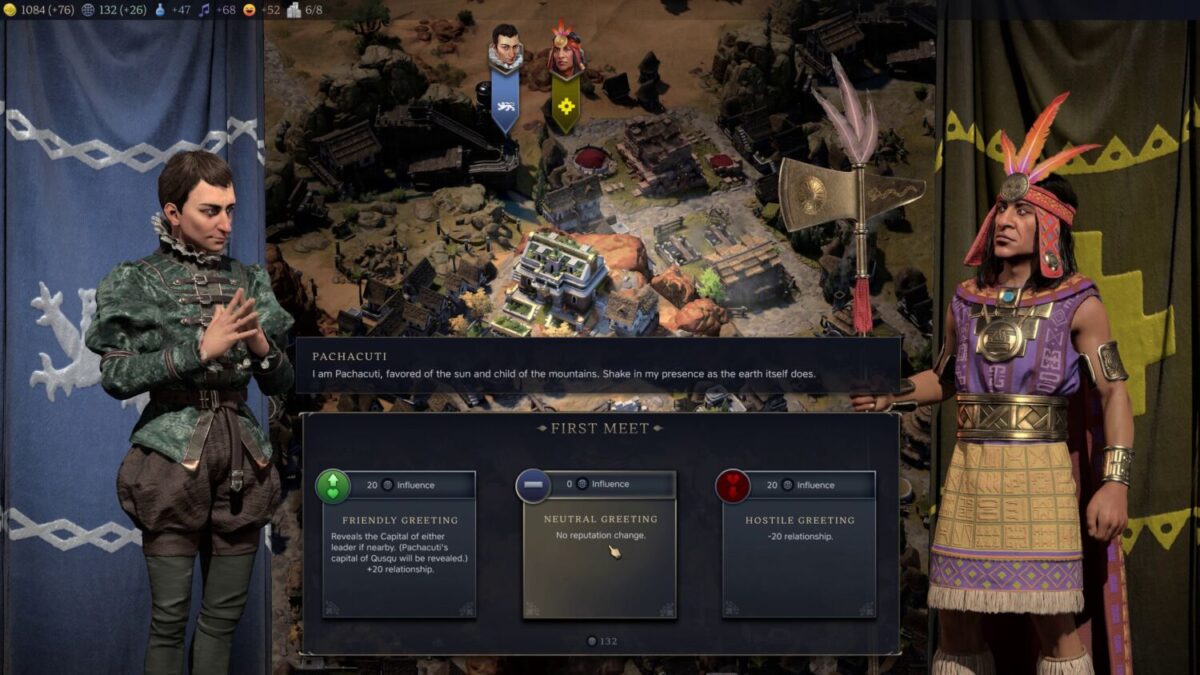
Strengthening relationships continues to be an integral part of the Civilization experience, taking place over different stages (Helpful, Friendly, Neutral, Unfriendly, and Hostile). Tied to leader agendas, otherwise known as their likes and dislikes, these can change depending on player actions, with no drawbacks or advantages to declaring a formal war. Doing so, however, will result in more War Support for the other side, a new mechanic that subjects the party with less War Support to War Weariness, causing Happiness penalties for all their Settlements and a combat penalty when fighting against their opponent.
Trade-wise, Civilization VII has moved away from the usual focus on exchanging resources to establishing Trade Routes. Creating one requires deploying a Merchant unit to the Settlement, where a land or sea route can be formed, each with its strengths and weaknesses. Upon completion, a trade caravan or ship will be generated, leaving it at risk of being plundered by enemy forces. In contrast, resources are automatically shared in that Settlement if a Trade Route is initiated to a player, allowing for more Gold and resource profit – double if it’s a sea route.
7) Reaping the benefits of meta progression
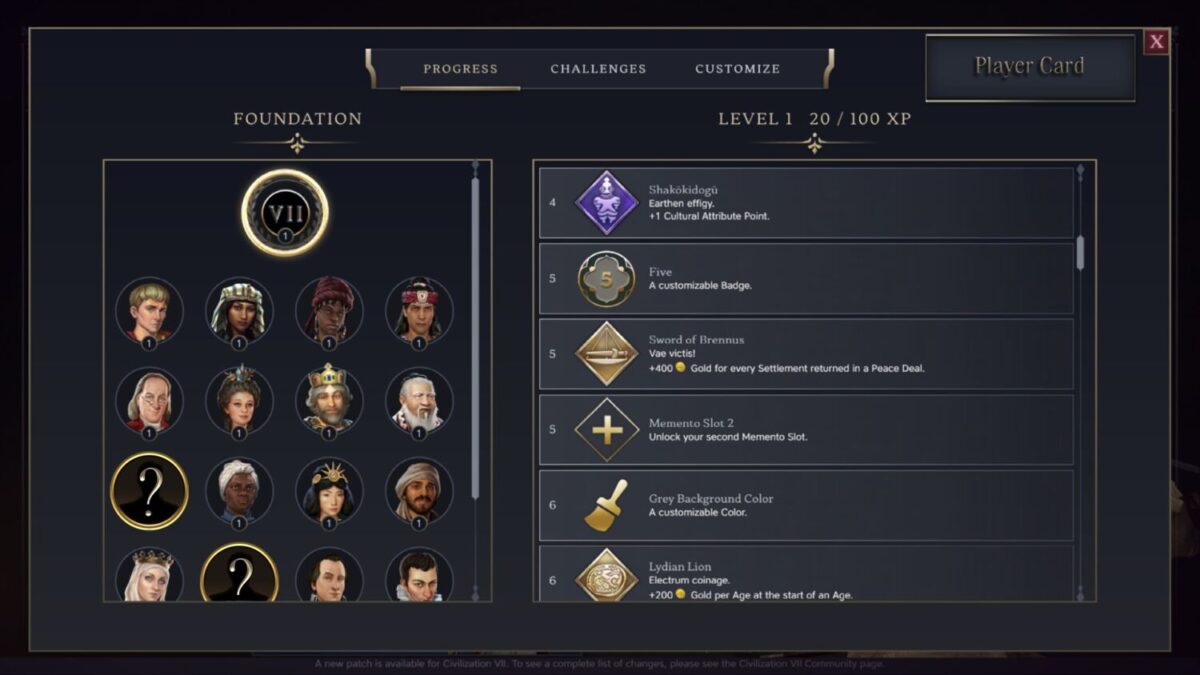
What’s better than playing Civilization VII however one wants? Getting rewarded for it. To encourage full campaign completion, the game introduces two types of Paths: Foundation Path, levelled up by playing any leader and maxing out at level 50, and Leader Path, levelled up by playing as individual leaders, with each having their own distinct 10-level track. Completing Challenges is the only way to earn the Legend XP needed for progression, where milestone rewards lie in wait.
The first takes the form of Cosmetic Collectibles, light-touch pay-offs within the Customise screens that allow players to modify a Player Card with various unique elements, including Badges, Banners, and Titles, alongside Borders and Background Colours for their recently played leader.
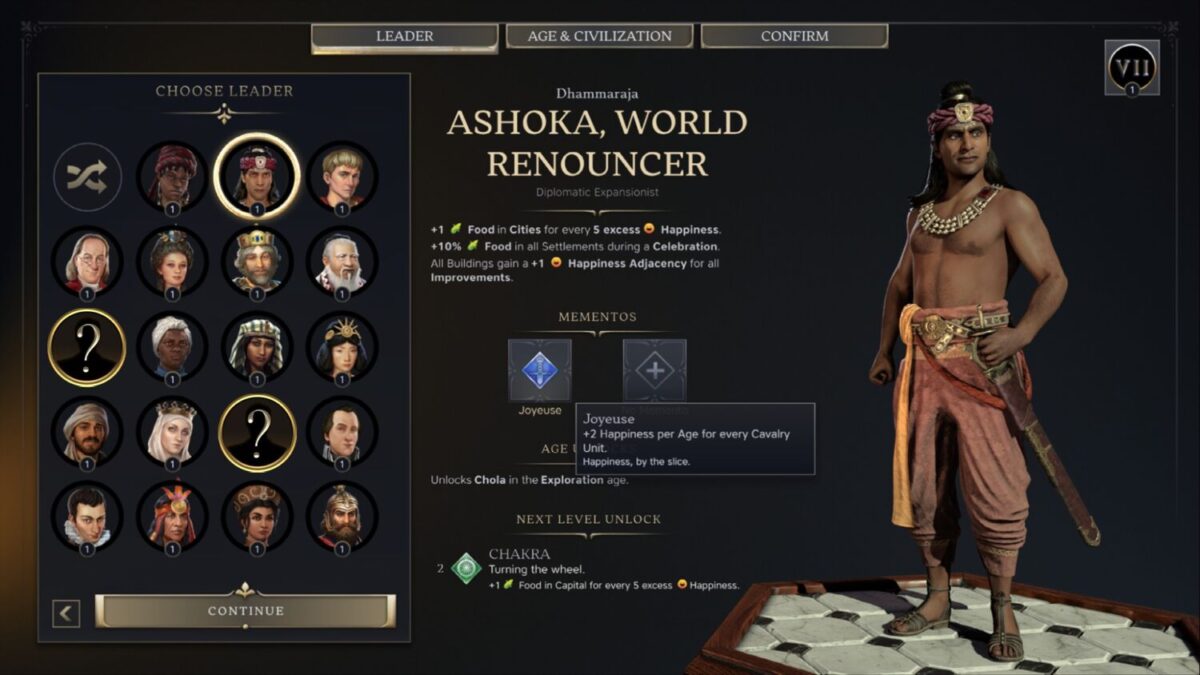
Meanwhile, Mementos are equipment offering a host of bonus effects, much akin to a piece of gear in role-playing games. With every leader maxing out at two Memento slots, there are nearly 100 of them to be earned in Civilization VII. That’s not all – while they may share natural synergies with their historical owner’s core abilities, Mementos can be assigned to any leader. Fancy Ashoka yielding Charlemagne’s gold-hilted sword Joyeuse? No problem at all.
With these options for players old and new, there’s no greater time to rewrite your own historical legacy and be the king of the world.
Civilization VII is out now for the PS4, PS5, Xbox One, Xbox Series X|S, Nintendo Switch, and PC.




